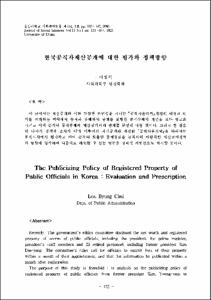지식경영능력이 조직 효과성에 미치는 영향에 관한 실증적 연구
- Alternative Title
- An Empirical Study of the Impact of Knowledge Management Capabilities on Organizational Effectiveness
- Abstract
- 본 연구는 정보시스템과 지식경영 연구의 이론을 토대로 조직의 지식경영 능력과 이에 따른 조직의 효과성과의 관계에 관한 실증적인 연구이다. 500개의 상장기업을 대상으로 실시한 설문조사를 통하여, 지식경영을 하고 있는 61개의 기업을 대상으로 분석한 결과는 다음과 같다. 첫째, 지식경영능력인 하부구조의 기반이 잘 형성될수록 조직의 효과성이 높게 나타남을 알 수 있었다. 특히 문화적인 하부구조가 조직의 효과성에 더 큰 영향을 미치는 것으로 나타났다. 둘째, 지식경영의 프로세스가 하부구조 기반아래 잘 구축될수록 조직효과성이 높다는 결과를 얻을 수 있었다. 그 중에서도 전체적으로는 모두 영향을 미치고 있음을 알 수 있으나 외부효과에는 지식응용이 내부효과에서는 지식획득 프로세스가 공헌도가 큰 것으로 나타났다. 프로세스 변수별에서도 역시 조직의 효과성중 외부효과에서는 지식응용이 내부효과에서는 지식획득이 더 큰 영향을 미치는 것으로 나타났다.
An empirical research to see the relationship of knowledge management capabilities and organizational effectiveness is conducted which is based on a theoretical background of information systems and knowledge management research. To make this more concrete, the following questions are taken into account: (1) Does the knowledge management infrastructure contribute to the organizational effectiveness? (2) Does the knowledge management process contribute to the organizational effectiveness? The research design employs a mail survey questionnaire for gathering data from among 500 firms in various industries. From the mail survey we gathered 61 responses from the top managers of knowledge management. The result of our analysis represents the following major findings: (1) While the external effectiveness of organization is influenced by the cultural infrastructure of knowledge management, the internal effectiveness is influenced by the structural infrastructure of knowledge management in terms of statistical significance. (2) While the external effectiveness of organization is influenced by the application and protection processes of knowledge management, the internal effectiveness is influenced by the acquisition and protection processes of knowledge management in terms of statistical significance.
An empirical research to see the relationship of knowledge management capabilities and organizational effectiveness is conducted which is based on a theoretical background of information systems and knowledge management research. To make this more concrete, the following questions are taken into account: (1) Does the knowledge management infrastructure contribute to the organizational effectiveness? (2) Does the knowledge management process contribute to the organizational effectiveness? The research design employs a mail survey questionnaire for gathering data from among 500 firms in various industries. From the mail survey we gathered 61 responses from the top managers of knowledge management. The result of our analysis represents the following major findings: (1) While the external effectiveness of organization is influenced by the cultural infrastructure of knowledge management, the internal effectiveness is influenced by the structural infrastructure of knowledge management in terms of statistical significance. (2) While the external effectiveness of organization is influenced by the application and protection processes of knowledge management, the internal effectiveness is influenced by the acquisition and protection processes of knowledge management in terms of statistical significance.
- Issued Date
- 2001
- Type
- Research Laboratory
- Alternative Author(s)
- Cheon, Myun Joong; Heo, Myung Sook
- Publisher
- 경영학연구논문집
- Language
- kor
- Rights
- 울산대학교 저작물은 저작권에 의해 보호받습니다.
- Citation Volume
- 8
- Citation Start Page
- 79
- Citation End Page
- 96
- Appears in Collections:
- Research Laboratory > Journal of management
- 파일 목록
-
-
Download
 000002025003.pdf
기타 데이터 / 940.53 kB / Adobe PDF
000002025003.pdf
기타 데이터 / 940.53 kB / Adobe PDF
-
Items in Repository are protected by copyright, with all rights reserved, unless otherwise indicated.